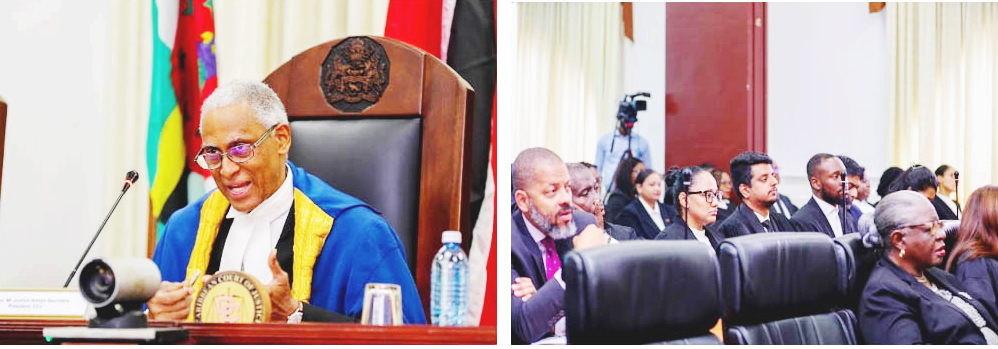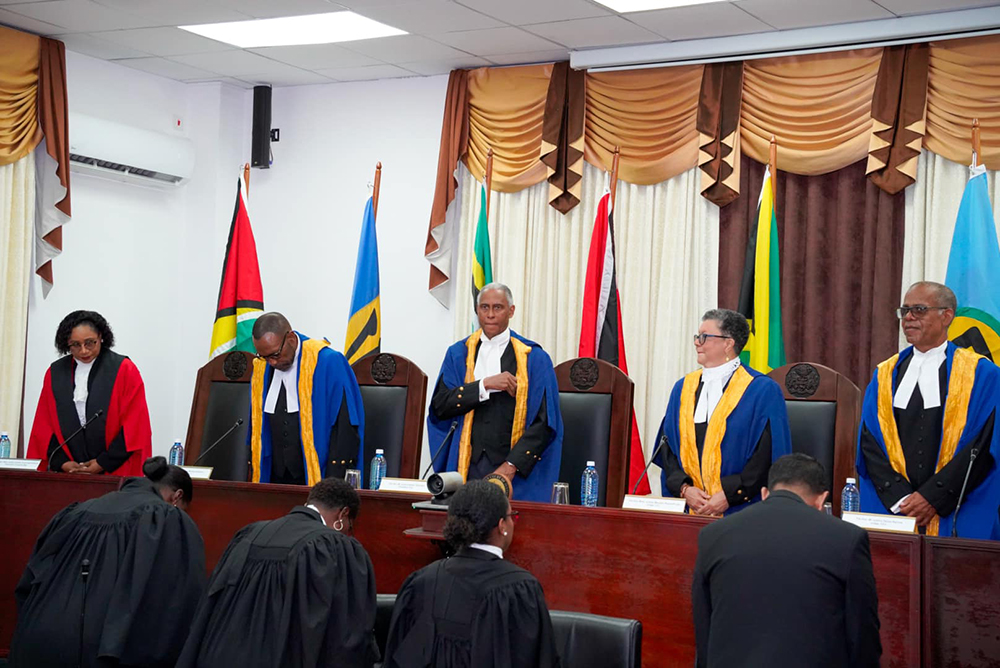In what was described as a significant day in the annals of Guyana’s history, the Caribbean Court of Justice (CCJ) held sittings locally, for the second time since its establishment eighteen years ago.
The regional court which has its seat in the twin island Republic of Trinidad and Tobago, is Guyana’s apex court, in both its appellate and original jurisdictions.
The court for the second time since 2014, is back on local soil to hold itinerant sittings which are open to the public at the Arthur Chung Conference Centre—from where it will hear five cases—two of which are from Guyana.

President of the CCJ, Justice Adrian Saunders in his address to attendees of the legal fraternity and other stakeholders, said that itinerant sittings are critical to the perception of justice.
He said that a regional apex court cannot function as effectively if it is perceived as a “remote, brooding, fallible omnipresence…Judges must avail themselves of appropriate occasions to interface directly with key stakeholders,” he added.
He continued, “throughout the Region, people of all walks of life need to have the opportunity to see from time-to-time, in flesh and blood; those who pass ultimate judgement on them.”
The scheduled two-day sittings commenced yesterday morning and will wrap-up later today; but the regional court will be here in Guyana for the next week with the aim of increasing public awareness of its role, methods of work and its place in the operations of the Caricom Single Market and Economy (CSME).
Justice Saunders shared that in particular the court will embark on what he said is an extended programme including activities to advance the on-going project developed with CARIFORUM and the funding of the 11th European Development Fund.
He shared that this project aims specifically to sensitize the judiciary of Guyana, the Bar and other stakeholders about the CSME and the role of the court and national courts and tribunals within that regime.
Referral process
He said that for the Judiciary and the Bar for example, the court will facilitate sessions to address the referral process under Article 214 of the Revised Treaty of Chaguaramas; as that facility is severely underutilised.
Over the next week of what he said will be a compact and robust schedule, Justice Saunders said that civil society, students of the University of Guyana and the public at large will be engaged; with the hope that mutual exchanges and learnings will ensue from those interactions as matters concerning the administration of justice are discussed, all with the aim of the court providing service of excellence to the people of Guyana and the Community at large.
The CCJ visit comes at a particularly embarrassing time for the Guyana Government as it has failed to take the requisite measures for the convening of a new Judicial Service Commission (JSC). The life of the last JSC ended in 2017 and the PPP/C government has been in office since August 2020. Despite appeals from the judiciary and civil society for a new JSC so that more judges can be appointed the government has failed to act. The government has also failed to act on repeated calls for the confirming of a Chancellor of the Judiciary and a Chief Justice. Justice Saunders himself had appealed to the government for confirmed appointments no later than December last year. President Irfaan Ali has failed to act on a proposal by the Opposition Leader on the appointments.
In her remarks to declare the sittings open, acting Chief Justice Roxane George SC said that Guyana was honoured to have its apex court sit at home, “directly serving our people,” describing it as a “household name.”
She said the CCJ “is not only our apex court…but it is a champion of judicial and legal education” as it engages with Bar associations, the private sector, civil society organisations and law students; “tangibly demonstrating that it is a court of and for the people.”
As it weaves together the several strands that make up the jurisprudential tapestry in the Region, Chief Justice George said that the CCJ also embraces the region’s diversity, even as she emphasized the necessity for inclusion and harmonization in ensuring that the Rule of Law is upheld.
She said that the enduring regional institution which is the CCJ, “educates, guides, and enjoins us to ensure that in upholding the Rule of Law, we engender public trust and confidence in our justice systems.”
Meanwhile, acting Chancellor of the Judiciary, Yonette Cummings-Edwards said that it was an important day in the annals of the history of Guyana as it was the second time since 2014 that the court is sitting here in its itinerant capacity.
She said that from 2004 to present, the court has been working assiduously to carve out a Caribbean jurisprudence that is second to none; while noting that the main purpose for its establishment was to promote the development of a Caribbean jurisprudence—a goal which said Caribbean courts are best equipped to pursue.
Forward-thinking
This court is known to be “revolutionary, forward-thinking and even ground-breaking,” she said.
Chancellor Cummings-Edwards shared that since its establishment to date, the court has presided in 111 matters for Guyana alone; underscoring that it has been dominated with local cases in the areas of criminal law, land law, constitutional law and elections cases.
With the first case from Guyana in 2006 to the cases currently listed before the court, the Chancellor said it is evident that Guyana has contributed significantly to the development of the Caribbean Court of Justice and its jurisprudence.
Against this background she said that lawyers, litigants and lay persons alike; have a voracious appetite for reading and discussing the judgments of the CCJ and giving their own opinions.
“Our contribution to the court therefore, is both in volume and content, given the various subject matters and the impact which the decisions have had and the discussions generated by citizens,” she declared.
She said that with the abolition of appeals from Guyana to Judicial Committee of the Privy Council on July 3rd, 1970, it was the local appellate court that remained the apex until the advent of the CCJ in 2005, “and since then, the legal landscape of Guyana was transformed tremendously.”
Justice Saunders had said that Guyana occupies a “very special” place in the hearts of the CCJ judges and staff as history will forever record that it was the first country to repose full trust and confidence in the court; when it acceded to the court’s appellate jurisdiction from the first day of its existence.
In her address, Chancellor Cummings-Edwards said “we are extremely happy that the court is sitting here today, so that all can see the humanity of physical presence, an important component in the delivery of justice.”
Referencing a quote from Andrew London KC, she said that justice has a human face and that the itinerant sitting afforded the opportunity for the human face of the CCJ to be seen.
She then went on to quote from Professor Suskin, that “the humanity of justice can only be achieved in a physical courtroom,” while adding, “Justice is personal, physical presence is essential, and levels the playing field.”
In bidding the apex court welcome to local shores, both the Chancellor and Chief Justice expressed the hope that their stay over the next week will be marked by impactful and fulfilling engagements.
In extending what he said is his deepest appreciation on behalf of the court, Justice Saunders said that the team’s welcome was a warm one from the Chancellor and Chief Justice, the judiciary as a whole and all others with whom they have had interactions; noting that the “people of Guyana are among the most hospitable,” he has encountered. Justice Saunders said that in order to better facilitate litigants and attorneys, the court had always made very liberal use of its technology for virtual hearings. He said that with the onset of the COVID-19 pandemic back in 2020, however, the court has held all of its proceedings in a virtual setting.
This itinerant sitting in Guyana Justice Saunders noted, is the court’s first in-person sitting since; noting that the court’s visit to Guyana at this precise time also holds symbolic significance as Caricom, which is headquartered here, observes its golden anniversary in just a few weeks.
Referencing one of the academic publications of Guyanese jurist and former judge of the CCJ, the late Professor Duke Pollard, Justice Saunders said he referred to the court as the institutional centrepiece of the CSME.
According to Justice Saunders that was, and remains a fitting descriptor, stating that the CCJ stands as both a product and a beacon of regional integration; as one of the “vital means” through which the aspirations of the people of the Caribbean Community; for peace, justice, economic advancement, stability and security can be realized.
Justice Saunders is accompanied on the visit by the full complement of the CCJ Bench which include Justices Marureen Rajnauth-Lee, Jacob Wit, Winston Anderson, Peter Jamadar, Denys Barrow, and Andrew Burgess, along with the court’s administration and support staff.
Among the cases being heard which also being live-streamed are two from Guyana, two from Barbados and one from Dominica.
The court ruled in one of the Guyana cases, dismissing an application by a rape convict to overturn the two life sentences imposed upon him.
The CCJ first sat in Guyana back in 2014, in tribute to daughter of the soil—and former Chancellor of the Judiciary, Justice Desiree Bernard to mark her retirement as a judge of the court.
Justice Bernard had been the lone female Judge sitting on the Bench of the CCJ at that time.
To date, the court has its second female Judge in Justice Rajnauth-Lee.
Yesterday’s proceedings were marked by a grand ceremonial opening which saw on display a parade by the Guyana Police Force and inspection of the Guard of Honour.
The Caribbean Court of Justice was inaugurated in Port of Spain, Trinidad and Tobago on April 16th, 2005 and presently has a Bench of seven judges presided over by President Saunders.
The court has an Original and Appellate Jurisdiction.
In its Original Jurisdiction, it is an international court with exclusive jurisdiction to interpret and apply the rules set out in the Revised Treaty of Chaguaramas (RTC) and to decide disputes arising under it.
According to a historical exposé on the court’s website, the RTC established the Caribbean Community (CARICOM) and the CARICOM Single Market and Economy (CSME).
In its Original Jurisdiction, the CCJ is critical to the CSME and all 12 Member States which belong to the CSME (including their citizens, businesses, and governments) can access the Court’s Original Jurisdiction to protect their rights under the RTC.
In its Appellate Jurisdiction, the CCJ is the final court of appeal for criminal and civil matters for those countries in the Caribbean that alter their national Constitutions to enable the CCJ to perform that role.
At present, five states access the Court in its Appellate Jurisdiction, these being Barbados, Belize, Dominica, Guyana and of recent; St. Lucia.
However, by signing and ratifying the Agreement Establishing the Caribbean Court of Justice, Member States of the Community have demonstrated a commitment to making the CCJ their final court of appeal.
“The Court is the realisation of a vision of our ancestors, an expression of independence and a signal of the region’s coming of age,” it says in its website.






